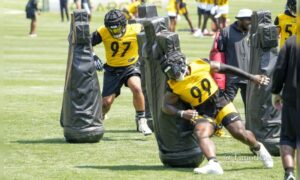By Matthew Marczi
The Pittsburgh Steelers did not draft Jarvis Jones in the first round just to have him sit on the bench all season as a 24-year old rookie. Just ask any one of the several local or national media outlets that have striven to magnify the supposed ‘battle’ between Jones and incumbent Jason Worilds for the starting right outside linebacker spot.
Perhaps there will legitimately be an open competition for the starting spot—although with just one day of training camp left there has yet to be any indication that the team intends to give Cameron Heyward the opportunity to unseat either Ziggy Hood or Brett Keisel for a starting defensive end spot, something many have reported will take place.
Perhaps he will be given the opportunity to unseat Worilds from his starting spot, back on the South Side when the team moves their practices back there next week after the game against the Washington Redskins.
But the reality is that, playing the odds, even if Jarvis Jones is afforded the opportunity to seize the starting spot come opening week, he is unlikely to win. And Jarvis Jones winning the starting job in his rookie season may not even be in the best interests of the team—may not get the most out of the player.
He may have flashed the potential to separate the ball from the runner and to bat down passes, but his pass rushing repertoire needs refining, he has been handled in blocking drills by tight ends Nathan Overbay and Jamie McCoy, and he needs to learn to set the edge of the defense properly against the run.
He also needs time to understand the defense.
It is certainly nothing for which Jones deserves any amount of blame; it is simply a fact of the matter. He understands how important it is to learn the intricacies of the defense, and he also understands that he still has a long way to go before he can say that he knows it, let alone feels comfortable executing it.
Being given the opportunity to log some time with the first team defense in a game, in fact, merely served to bring home to him the fact that he still has a lot to learn:
[The starters] talk a lot more than the other guys because they understand where they need to be and where we need to be to make plays to get off the field. As far as students of the game they are way past us. With the other guys we are learning it all together.
They are way past where I am as far as understanding this defense and the game of football. I just have to continue to work on my technique, craft and being a student of the game. Being out there with those guys, you have to play up to their potential. That’s what gives me energy. It brings intensity to the game of football.
Having an inexperienced player out there on defense for 70 snaps a game is not doing the Steelers any favors. Nobody knows this better than the architect behind that defense, Dick LeBeau.
For as much vitriol as he receives, William Gay is the type of player that LeBeau simply cannot get enough of. Having a player like Gay on the field allows LeBeau to do so much, because it allows the defense to be versatile. Because he knows his players on the field can adjust on the fly and can communicate with one another. Because they can do multiple things on the field.
William Gay is a jack of all trades, and master of none. This is no secret. He is not an exceptional athlete, but he can play cornerback, nickel, and safety. He can blitz well off the edge. He can cover for somebody else ad libbing on a read. He can even block a punt. It is versatility and synchronicity as much as pure talent that makes Dick LeBeau’s defense, or any great defense, work so well.
Tremendous athletes such a Troy Polamalu and Lawrence Timmons have the ability to ad lib within the defense not only because they understand it, but because everybody else around them understands as well. When Ryan Mundy was in a game over the years for Polamalu, it significantly curbed the options at LeBeau’s disposal; or as he might put it, he suddenly got a lot dumber.
The outside linebacker position in LeBeau’s 3-4 is not the same as it is in other defenses around the league. I have highlighted their significantly greater than average responsibilities in pass coverage, for example, and that is not an easy thing for a rookie to embrace. One day Jones will probably be one of those special talents that have the privilege of playing their instincts in LeBeau’s defense, but he is not there yet.
The fact is that Jarvis Jones is very likely ahead of the learning curve as far as rookies are concerned. He is slightly older, played in a 3-4 in college, and is a willing learner. And that will help him get on the field plenty as a rookie. But the odds are that it will be in sub-packages, where he has specific assignments and can be his most effective, least encumbered, most explosive, in his first season—not as the starter.







